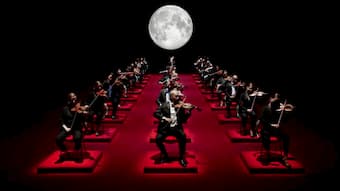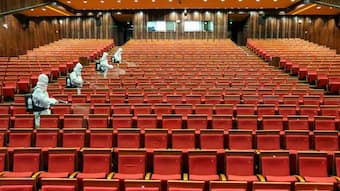
Socially distanced musicians © Classic FM
2020 was the year of silent concert halls and shuttered opera houses and theatres. Yet the music played on, as musicians, ensembles, orchestras and venues were determined to continue to offer performances via livestreams and video casts, and, when possible, live concerts to a limited socially-distanced audience.
Over the past year, we have grown used to restrictions on our activities and the protocols associated with “controlling the [corona]virus”, from hand sanitising to keeping a safe distance from others. Musicians, venues, concert organisers and audiences have adapted quickly to new ways of doing things – from spaced out orchestral desks and singers to performances in empty halls and Zoom choirs – but many crave a return to something like the old normal, when concert halls and opera houses were full to capacity and audiences did not have to follow one-way systems and sit separated from others in the auditorium.
Benjamin Britten: Simple Symphony, Op. 4 (version for string quartet) – II. Playful Pizzicato (I Musici; Antonio Anselmi, cond.)
2021 began on a hopeful note with the roll out around the world of new vaccines against coronavirus, but it will take time for the effect of such measures to be sufficiently efficacious for us to return to something like the “old normal” of 2019. In the meantime, what might classical music look like in 2021?
Smaller socially-distanced audiences are now an accepted part of concert-going in the time of corona. As restrictions are eased, concert halls and opera houses will be able to gradually increase capacity but with measures remaining in place to ensure audiences feel safe: this may include hand sanitisers, temperature checks, restricted access to social spaces where people congregate such as bars and cafés.

© Getty Images
Musicians will be subject to regular testing/temperature checks in order to enable orchestras and ensembles to perform safely and, gradually, with a greater number of players.
With travel restrictions and quarantining likely to remain in place for some time, musicians and orchestras will travel less. Additionally, touring is expensive and logistically complicated, particularly with all the extra red tape associated with coronavirus. However, this need not be seen as a negative impact; instead, it is an opportunity to celebrate homegrown talent and our wonderful national and regional orchestras, ensembles and music festivals.
Livestream performances are definitely here to stay. They have been shown to increase audience engagement and for many musicians and ensembles are now an integral part of live programming. Even with the return of live concerts and opera, livestream will remain as a way to reach a wider audience and allow people to enjoy a concert or opera after the event, in their own time, in the comfort of their own home. Better financial models for livestream will make these performances more economically viable, while improved audio/video capability and more innovative filming make these livestreams much more than a simple broadcast of the concert, but an unique experience in its own right.
With rapidly changing guidance concerning government-imposed coronavirus restrictions, musicians have had to learn to be more agile and adaptable. This calls for short-term planning and for many musicians, this has encouraged greater creativity and pragmatism when planning programmes and events. It has also led a number of leading musicians, including the British pianist Stephen Hough, to question the appropriateness of full-length concerts and suggest a rethink in how classical music is presented. We are already seeing shorter concerts or two performances of the same programme on the same day, in order for venues to accommodate as many audience members as possible within the limitations of social distancing. Expect to see more of these kinds of concerts in the coming year, as well as performances outside of traditional settings.
There are still tough times ahead. Many musicians and arts organisations are in severe financial straits, and some have been forced to leave the profession to seek work elsewhere in order to survive. But musicians are also straining to get back to what they are best at: performing music to a room full of people and creating an electric, memorable experience. 2021 has the potential to be a wonderful year of resurgence as music fills our concert halls and opera houses once again.
For more of the best in classical music, sign up to our E-Newsletter



